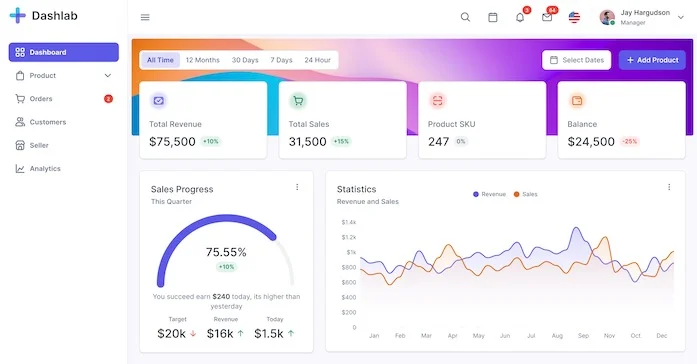SEO Management. Surely, you`ll heard it ages ago.
When talking about websites, you’ll almost certainly encounter the word “SEO Management” and how it can benefit your business in the long run.
And while SEO management is indeed a key ingredient in ranking high on search results and achieving business success, you may wonder, what exactly is it? What happens during the entire process of SEO management? What does an SEO manager do?
In this blog post, we’ll dig deeper into those questions, including best practices of SEO management, so you’ll gain more appreciation of the value of hiring an SEO manager and the ways they can assist your business.
Table of Contents:
Understanding SEO management?
SEO management is the strategic process of planning, implementing, and monitoring SEO techniques to enhance a website’s organic search engine rankings and visibility. The primary goal of SEO management is to drive relevant organic traffic to a website, which can lead to increased brand awareness, customer engagement, and conversions.
Simply put, SEO management is the process of implementing various planned SEO strategies and monitoring them to see whether they are effectively ranking the website on organic search results.
To give you another perspective, let’s look further into the role of an SEO Manager, who’s also referred to as an SEO consultant or SEO expert in some cases.
While they may possess SEO-related skills and experience like blog writing and programming, they may not be the ones to do them. Rather, their main responsibility is to oversee the entire process and ensure everyone is on the same page toward the same goal. This involves:
- Managing teams like creative, writers, marketers, programmers, and others.
- Monitoring the progress and outcomes of SEO efforts and making necessary tweaks to strategies
- Building and maintaining relationships with clients and stakeholders.
As you can see, it’s a holistic approach that requires a mix of creativity, critical thinking, and problem-solving skills so that your website remains on top of SERPs throughout the campaign.
The Role of an SEO Manager
An SEO manager, often referred to as an SEO consultant or expert, plays a pivotal role in overseeing and executing SEO campaigns. While they may possess various SEO skills like content writing or technical optimization, their core responsibility lies in managing the overall SEO process. This includes:
- Leading teams of creatives, writers, marketers, and developers.
- Monitoring the progress and outcomes of SEO efforts.
- Adapting strategies based on data and insights.
- Building and maintaining relationships with clients and stakeholders.
Why SEO Management is Crucial for your Website
Effective SEO management is critical specially in todays fast-paced digital environment, when attention spans are short and competition is intense. By making your website search engine optimised, your business can;
- Enhance Visibility: Improve your website’s ranking in search engine results pages (SERPs), making it more discoverable by your target audience.
- Increase Organic Traffic: Attract relevant visitors who are actively searching for products, services, or information related to your niche.
- Boost Credibility and Trust: Higher search rankings often signal credibility and trustworthiness to potential customers.
- Gain a Competitive Edge: Outrank your competitors and capture a larger share of organic search traffic.
Key Components of SEO Management
There are several unique ways SEO managers approach and carry out SEO management. However, they typically include the following:
1.Website audit
Website audit is a crucial first step because here, your website will be thoroughly examined to uncover issues that may be keeping your website from ranking high in search results, such as broken links, slow loading speed, crawlability issues, and so on. This way, we’ll know the urgent ones that need to be fixed.
2. Keyword research
Keyword research involves analyzing and selecting high intent keywords or phrases that audiences in your industry or niche use when they’re searching for a product or service online. It also involves studying the preferences and interests of your target audience and the SEO practices of your competitors. All these would help us come up with the best keywords your website can rank for.
3. Content creation and management
Content creation is simply crafting content like blogs, articles, media, and infographics that your audience will find useful and engaging. On the other hand, content management is more concerned with the organization of the content that was created, including topic clustering, schedules for publishing content, and so on.
4. On-Page optimization
On-page optimization involves optimizing your website’s on-page elements, more importantly, the technical elements, such as your site speed, responsiveness, site security, 404s, and so on. Here, we ensure that your website complies with the technical rules and requirements so the search engine can understand your website more easily.
5. Off-Page optimization
Off-page optimization focuses on actions that can be taken outside of your website but still have an impact on your website’s rankings. This includes techniques like backlinking and social media marketing to increase your website traffic and gain more credibility, which can lead to improved rankings.
6. Monitoring and reporting
Monitoring and reporting basically deal with tracking the progress and results of the SEO campaign and making the necessary adjustments based on the data. SEO managers use a variety of tools to measure traffic, keyword rankings, and other key metrics to help inform them of the next steps to take to improve your site.
Factors Influencing SEO Management
What factors do SEO managers look into during the entire SEO management? These factors include the following:
Goals
Your goals as the client will determine how extensive the SEO campaign will be. So, take a seat and take time to establish SMART goals. Are you focusing on increasing your traffic? Are you looking to generate more sales?
Target Audience
A key component of efficient SEO management is knowing who your target audience is. Attracting the proper kind of traffic—that is, visitors who are actually interested in your goods, services, or content—rather than merely increasing website traffic is more important. This is how your SEO approach is influenced by your target audience:
Competition
By studying your business’s competitors, your SEO manager will be able to emulate successful SEO practices as well as identify gaps that can be filled to make your website stand out.
Current SEO trends
SEO managers are always on the lookout for emerging SEO methods and technologies that can be used to enhance the performance of your website, as well as track the progress of their SEO efforts more effectively.
Search engine algorithm updates
As algorithms are constantly changing, SEO managers stay vigilant so they can promptly make necessary adjustments to the current SEO strategies and prevent your website from falling behind rankings.
Best practices for SEO management
While the SEO manager would be doing the SEO work for you, it’s still important that you know the best practices of SEO management. This can help you understand what your SEO manager is doing to improve your website’s overall performance. Apart from that, you’ll have a more realistic expectation of the outcomes and make better decisions for your website.
1. Create High-Quality Content
Good SEO management starts with producing content that is of a high calibre. Content that is interesting, pertinent, and instructive for users is given priority by search engines. An increase in dwell time, social sharing, and backlinks are all benefits of well-written content that go towards improving search engine results and organic traffic.
2. Optimize for Relevant Keywords
Conduct thorough keyword research and incorporate relevant keywords naturally into your content and metadata.
3. Build High-Quality Backlinks
Earn backlinks from reputable and authoritative websites to enhance your website’s authority and credibility. There are several tactics youc an use to gain high-quality backlinks.
4. Optimize Website Speed and Performance
Ensure your website loads quickly and provides a seamless user experience across devices.
5. Monitor and Analyze Data
Regularly track your website’s performance using SEO tools and analytics to identify trends and areas for improvement.
6. Stay Updated with SEO Trends
Keep abreast of the latest SEO best practices and algorithm changes to maintain and improve your website’s rankings.
How KBA Web provides SEO management services
At KBA Web, we pride ourselves on being able to help several businesses by assisting them with their SEO management. This is how we do it:
1. Understand the target audience
First, we take time to understand your target audience, including their needs, preferences, and behaviors. What trends are they hopping on? What are they interested in? What topics do they resonate with? This will greatly help in selecting the right keywords to rank for, creating valuable content for your website, and making the right decisions in terms of your website’s structure and user experience.
2. In-depth research
Once we have a deep understanding of your target audience, we conduct in-depth research to identify the right keywords for your business. This involves taking a look at the difficulty and competition of using each keyword to help us make informed decisions on which ones to prioritize in terms of ranking.
Apart from that, we study your competitors to identify their strengths and weaknesses. We also analyze your website’s content and performance to see which areas need urgent attention.
3. Plan the best strategy, with a backup plan
Based on the information we have gathered, we create a comprehensive search engine optimization strategy, including both on-page and off-page optimization techniques. In case of any unexpected circumstances, we prepare contingency plans to quickly make adjustments to the strategy whenever necessary.
4. Make a strategy implementation plan and a road map
With a strategy in place, we further break them down into more specific, actionable steps that are easier to follow and measure. With that as our basis, we carry out the necessary actions to enhance your website’s performance. Some of these steps include creating high-quality content, link building, regular website audits, and so on.
5. Monitor the result
Through the use of advanced tools and analytics, we keep track of the progress of our SEO efforts and check them against our goals and objectives. This includes looking at your website’s traffic, rankings, conversions, and other metrics.
6. Re-assess the strategy if the goal is not achieved
If we see that our strategies have come up short of achieving our goals, we examine what’s not working and make the necessary adjustments to rectify it. Here, we develop a plan once again and create a roadmap featuring new and modified approaches so we can hit our objectives.
7. Monitor the result (again)
Again, we continue to monitor the progress and results of our new approach to see if it’s finally getting the job done. We analyze the data through the use of modern tools and look for opportunities we can capitalize on.
8. Continue strategies that are working
Once we see results from our SEO strategy, we keep the ball rolling and stick by the strategy. Of course, it doesn’t end here. We continue to monitor our progress and make necessary adjustments to sustain success. This involves keeping up with the latest algorithm changes and any emerging SEO methods and technologies to improve our current strategy and deliver the best results for your website.
Final thoughts
With all being said, SEO management is a long-term strategy that requires time commitment and a lot of effort before we can reap results. It takes creativity and critical-thinking skills on the part of the SEO manager, as well as your dedication and cooperation as the website owner. As many website owners would agree, staying committed to the plan is a key to achieving the desired results.






